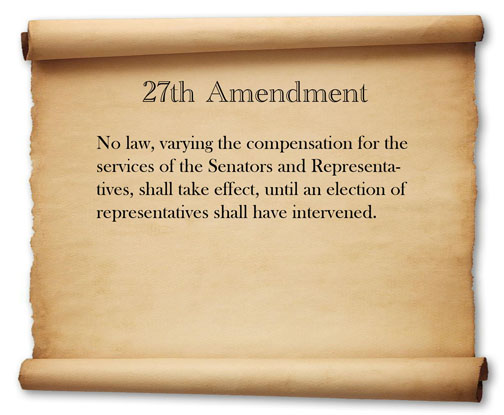Earlier this month, as part of the fiscal cliff deal, Congress gave itself an unconstitutional pay freeze.
This was no surprise. For ten of the last twenty years, Congress has frozen its own pay by undoing automatic cost-of-living adjustments. These adjustments, provided by the Ethics Reform Act of 1989, are supposed to ensure that government salaries keep up with inflation. Because of its annual freeze, salaries for members of Congress have not budged since 2009.
Why was it unconstitutional for Congress to freeze its own pay? Because it violated the Twenty-Seventh Amendment: “No law, varying the compensation for the services of the Senators and Representatives, shall take effect, until an election of Representatives shall have intervened.” If Congress wanted to freeze its pay for the two-year term starting in 2013, it had to do so beforethe November election. Instead, Congress waited until after the election–January 1–to “vary” its pay by repealing a cost-of-living adjustment that had already taken effect. Congress can no more repeal a previously enacted raise than it can give itself a pay cut (to benefit politically–saving the taxpayer money) then repeal the cut as soon as the election is over.
It may seem odd that the Twenty-Seventh Amendment prohibits pay decreases. To the extent that people think of the Amendment at all, they think of it as a restriction on increases in congressional salary. The big push for its ratification happened in the mid 1980s and early 1990s, as part of a general backlash against congressional profligacy. On the date of its enactment, the New York Times wrote that “the newly ratified constitutional amendment… prohibits [members of Congress] from voting themselves immediate pay raises.” Ironic, then, that the Amendment’s principal effect today is (theoretically) to restrain Congress from cutting its salary.
And yet, reading the Amendment in the context of its broader history, this irony appears less acute. It was proposed as part of the Bill of Rights in 1789 and would have been the Second Amendment. (There were twelve amendments in the original Bill–those we now know as one through ten were initially three through twelve). What little legislative history that exists suggests that one of the background concerns in debates over the Amendment was the tendency of wealthy legislators in England to use their wealth as a tool of power. Members of the British House of Commons had sought political advantage by cutting their own salaries, and such pay cuts made it difficult for people of more modest means to run for political office. Delaying the effective date of laws that cut Congress’s pay until after the election would render this strategy less effective.
The Amendment was not ratified by the founding generation–it passed through Congress but failed to secure the necessary votes of three-quarters of state legislatures. It was revived nearly two hundred years later, when a college student named Gregory Watson wrote a paper arguing that it could still be ratified. He received a “C” on the paper. Then he went on to launch a grassroots letter-writing campaign to convince state legislatures to finish the ratification process that began in 1789. Between 1983 and 1992, this campaign intersected with the larger budget politics of the Reagan/Bush era, and Watson was ultimately successful. The Amendment took effect in May 1992.
The text that was ratified in 1992 is the same that was proposed in 1789–it says any law “varying” Congress’s salary, not “increasing.” Hence the irony of the Twenty-Seventh Amendment: resurrected to prevent pay increases, its effect today is to render Congress’s routine salary decreases unconstitutional.
It seems likely that Congress will continue to ignore the Twenty-Seventh Amendment by freezing its pay through laws that take effect before an election intervenes. Indeed, one Republican proposal in the current debate over raising the debt ceiling calls for withholding congressional pay altogether until a budget is passed. This might be fine if the pay were merely delayed, but Congress cannot withhold its pay indefinitely unless it does so for the period after the next election.
Of course, current and former members of Congress could always sue to recover their back pay (though that probably would not help with reelection for current members). Interestingly, they have done so in the past. In 1994 several members of Congress sued to have the law providing for cost of living adjustments invalidated under the Twenty-Seventh Amendment. This argument was rejected by the D.C. Circuit Court of Appeals, but the members also argued in the alternative that congressional pay freezes are unconstitutional under the Amendment (the court avoided deciding that issue on a technicality). The lead plaintiff in that case was a Republican named John Boehner, now Speaker of the House. If he wants a nice bump in salary, he could always bring that suit again.
Eric Fish is a 2011 graduate of Yale Law School. A longer version of this argument appeared in the National Law Journal the last time Congress violated the Twenty-Seventh Amendment, in 2012.










